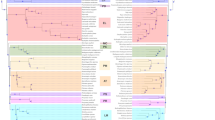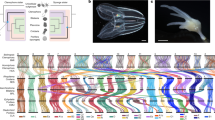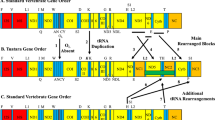Abstract
Convergence can mislead phylogenetic inference by mimicking shared ancestry, but has been detected only rarely in molecular evolution. Here, we show that significant convergence occurred in snake and agamid lizard mitochondrial genomes. Most evidence, and most of the mitochondrial genome, supports one phylogenetic tree, but a subset of mostly amino acid-altering mitochondrial sites strongly support a radically different phylogeny. These sites are convergent, probably selected, and overwhelm the signal from other sites. This suggests that convergent molecular evolution can seriously mislead phylogenetics, even with large data sets. Radical phylogenies inconsistent with previous evidence should be treated cautiously.
Similar content being viewed by others
Article PDF
Author information
Authors and Affiliations
Corresponding author
Rights and permissions
About this article
Cite this article
Castoe*, T., de Koning*, A., Kim, HM. et al. An ancient adaptive episode of convergent molecular evolution confounds phylogenetic inference. Nat Prec (2008). https://doi.org/10.1038/npre.2008.2123.1
Received:
Accepted:
Published:
DOI: https://doi.org/10.1038/npre.2008.2123.1



